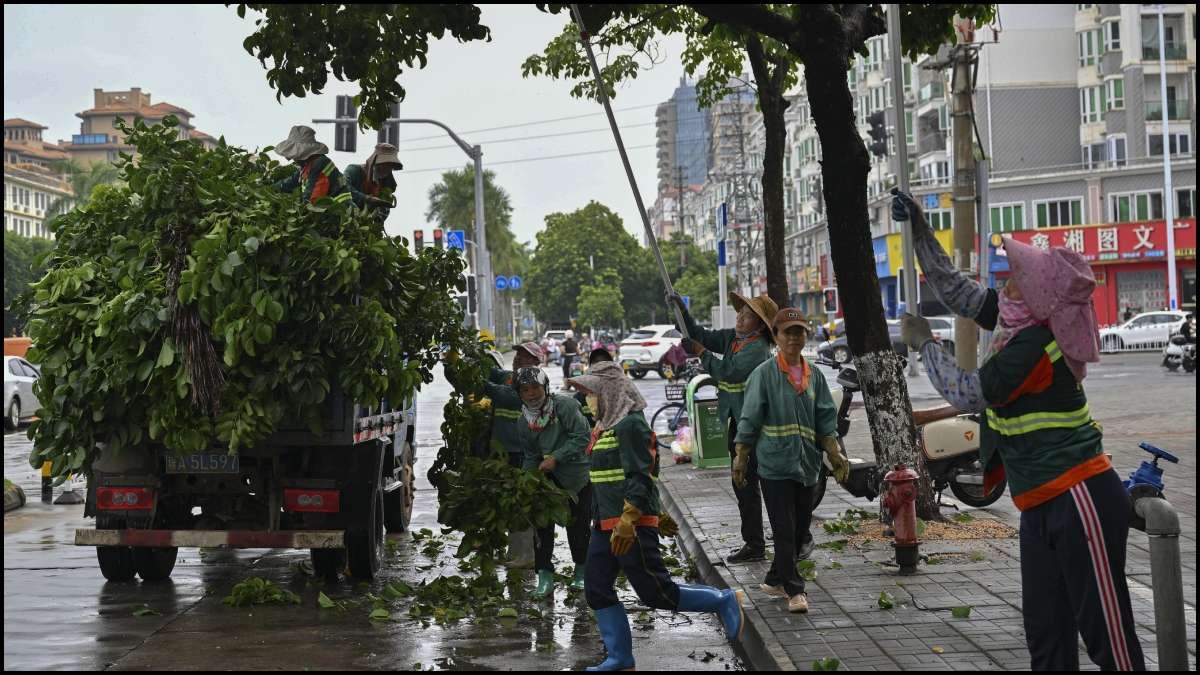
International: Super Typhoon Yagi, believed to be Asia's strongest storm this year, brought heavy rain and huge gusts of wind to Hong Kong before making landfall along the coast of China's Hainan province on Friday, forcing several aspects of life to a halt. Yagi packed maximum sustained winds of 234 kmph near its centre and was registered as the world's second-most powerful tropical cyclone in 2024 so far after Hurricane Beryl.
Yagi forced over 250 people to seek refuge at temporary government shelters and led to cancellations of more than 100 flights in the city, while schools and businesses remained closed on Friday. The typhoon 8 signal, the third highest, was lowered by 12:40 pm (local time), Hong Kong's observatory said, with winds over the city expected to weaken gradually as Yagi moves away.
Hong Kong's airport authority said operations had largely returned to normal after 50 flights were cancelled on Thursday, and the city oalso lowered its typhoon 8 warning, the third highest, by a notch after midday, with winds expected to weaken gradually as Yagi moves away, allowing businesses to reopen. The world's longest sea crossing, the main bridge linking Hong Kong with Macau and Zhuhai in Guangdong, also reopened on Friday afternoon.
What is Typhoon Yagi?
Yagi is the most severe storm to land in Hainan since 2014, when Typhoon Rammasun slammed into the island province as a Category Five tropical cyclone. Rammasun killed 88 people in Hainan, Guangdong, Guangxi and Yunnan and caused economic losses of more than 44 billion yuan ($6.25 billion). Its landfall in Hainan is rare, as most typhoons landing on the duty-free island are classified as weak.
However, residents of Hong Kong told Reuters that the impact of the storm was lighter. "This typhoon didn't hit Hong Kong directly, and its winds weren't as strong as Typhoon Mangkhut. It was more intense when I was sleeping last night because I could hear the sounds outside. But this morning, it was gone and very weak," said Sui Cheung, 51.
Yagi, which strengthened into a super typhoon on Wednesday night, is named after the Japanese word for goat and the constellation of Capricornus, a mythical creature that is half goat, half fish. Formed over the warm seas east of the Philippines and following a similar path to Rammasun, Yagi arrived in China as a Category Four typhoon, ushering in winds strong enough to overturn vehicles, uproot trees and severely damage roads, bridges and buildings.
Yagi to hit Vietnam next
After more than doubling in strength since killing 16 people in the northern Philippines earlier this week, Yagi slammed into the city of Wenchang on Hainan island. In Hainan's capital Haikou, streets were deserted as people stayed indoors, photographs on social media showed.
The typhoon had shut schools, businesses and transport links in Hong Kong, Macau, Hainan and Guandong as well as airports in Vietnam, which it is predicted to hit, along with Laos, over the weekend. Vietnam's Civil Aviation Authority said four airports in the north, including Hanoi's Noi Bai International, would be closed on Saturday due to the storm.
Typhoons are becoming stronger, fuelled by warmer oceans, amid climate change, according to scientists. Last month, Typhoon Shanshan, touted as one of the worst storms to hit the region, made landfall in southwestern Japan, leaving seven people dead and widespread damage in several parts of the country.
--Advertisement--

 Desk
Desk Share
Share






